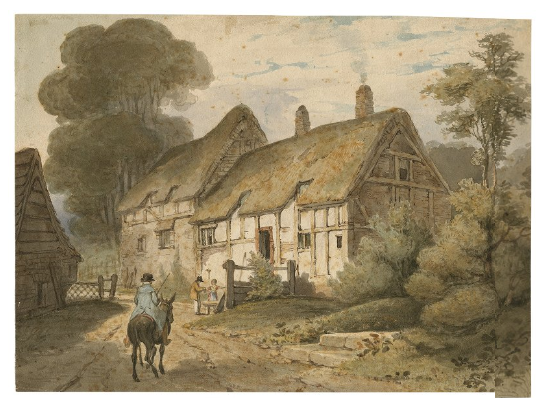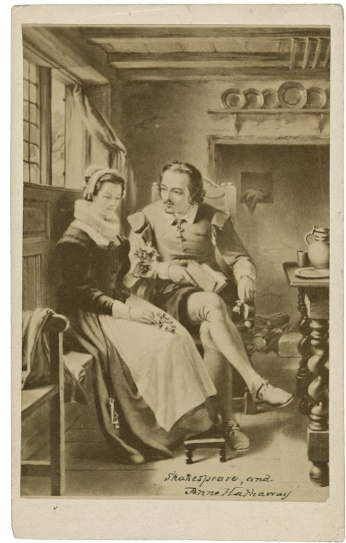Born in either 1555 or 1556, Anne Hathaway, also recorded as Agnes, was the eldest of her eight siblings. She lived on a farm formerly known as Hewlands, but now is called Anne Hathaway’s Cottage. Hewlands functioned as a sheep and crop farm. When her father Richard Hathaway passed away, he left Anne six pounds, thirteen shillings, and four pence to be given to her on her wedding day.
Controversially, Hathaway married William Shakespeare in November of 1582, just months after becoming pregnant with Shakespeare’s child. Because Shakespeare was younger than Hathaway, and was considered a minor at the age of 18, the couple was granted a special license to marry. Two different variations of Hathaway’s name are found on their marriage documents because of the controversy: “Anna Whateley of Temple Grafton” and “Anne Hathwey of Stratford.”
Hathaway and Shakespeare most likely lived in Henley Street, Stratford-upon-Avon until Shakespeare bought New Place in 1597. Hathaway’s role as Shakespeare’s wife, besides taking care of their children Susanna, Judith, and Hamnet, most likely consisted of baking bread, brewing ale, and tending to the house. However, Hamnet, Judith’s twin and their only son, passed away in 1596 at the age of 11. Some argue Hamnet lives on through Shakespeare’s character Hamlet.
When Shakespeare was away in London, which was often, Anne rented rooms in their home New Place to lodgers, friends, and guests. New Place had two barns, multiple gardens, and two apple orchards. Actor Thomas Greene was also said to have stayed at New Place for quite some time. This created quite a bit of revenue for the family and gave Anne an even bigger leadership role in the family.
Hathaway became a widow at the age of 60 and is mentioned in Shakespeare’s will. Although she had no part in the creation of the will, he left her his second best bed and his furniture. Some think that because it is only the second best bed, the couple maybe didn’t really love each other that much. Others think that this has little significance, for they must have had an agreement before Shakespeare passed that made sure Hathaway would be secure.
The name “Anne” is mentioned only 82 times throughout her husband’s works. However, Sonnet 145 seems to resemble Hathaway the most, as some argue that it is an early love poem for Hathaway. In this sonnet, Shakespeare plays with the combinations of words, “hate away,” which may resemble Hathaway and the throwing away of negative emotions, as well as the throwing away of Hathaway’s maiden name. Also, in Shakespeare’s Hamlet, some see resemblances between Hathaway and the character Gertrude, as there was high suspicion that Anne committed adultery with his younger brother.
Hathaway passed away in 1623, in Stratford.


